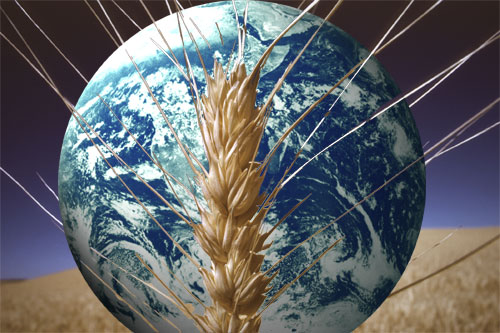We're all aware of the turmoil in the Middle East. Many of us know that staple food prices have been going up. But not as many people understand that we are seeing global climate change push its way into world politics in an unprecedented way.
Right now food prices worldwide are at an all-time high
Global food prices increased for the eighth consecutive month in February, with prices of all commodity groups monitored rising again, except for sugar, [UN Food and Agriculture Organization] said today. (Climateprogress.org, March 3, 2011)
For most Americans, who buy a two-dollar loaf of bread that has a nickel or a dime's worth of wheat in it, this is a nuisance but not a severe threat. But to people who live much closer to the edge, this means hunger. This has been a major trigger of the uprisings in Tunisia, Egypt, Libya, and nearly every other country in the Middle East. Countries like Morocco that have not yet had major unrest are increasing food subsidies for this exact reason. Of course there are plenty of other reasons to rebel– oppression, corruption, stagnation, etc. – but food prices helped to trigger this upsurge now. (The next-highest prices for food were in 2008, and there were food riots then.)
If you follow the media carefully, you can find that food prices are an issue in all this unrest. But what you probably won't see or hear is that climate change is a major factor in the high prices. Wheat is scarce because Russia had an extreme heat wave accompanied by massive forest fires, and as a result cut off all wheat exports. Australia – the world's second-biggest wheat exporter – had a miserable harvest after years of drought and huge forest fires as well. And Pakistan suffered floods that made twenty million people homeless, greatly affecting food production there too.
All of this unstable weather fits completely with the projections of what climate change has in store for us. It is happening now. It is causing hunger now. It is causing political turmoil (and high gas prices) now.
Highly respected leader of the Worldwatch Institute Lester Brown believes “We’re in a dangerous situation and we really don’t realize how dangerous it is.” Brown senses the time might be right for the world to consider an “International Food Reserve” to act as a control on the interacting supply and demand factors...“We’re going to be living with tight food supplies and higher prices and all the instability that brings — through this harvest and likely the next harvest.” (Climateprogress.org, March 9, 2011. Brown cites climate change and other factors, including rising population and falling water tables, as reasons for food shortages.)
What's coming next? With something as complicated as climate change we can't predict exactly what will break down, when, and how. We are not far from a crisis that could cause major food shortages. For now, it looks as if we may be dodging a bullet in China, which is getting rains that may end what looked like the worse drought in a long time. China is normally self-sufficient in food, but obviously, if they had a bad harvest, they have enough money to buy food and drive up world food prices.
Can you imagine what will happen when there are bad harvests here in the Midwest, the world capital of food exports? It's too early to say, but there is a threat that the heavy snowpack in the upper Midwest will cause major flooding this year, with a big effect on harvests. And heavier overall precipitation (rain or snow) is another predicted result of climate change – even while some places suffer drought.
In the long run, we will have much more unstable climate, and regions that now grow much of the world's food will be unsuitable. In the long-run, a good deal of low-lying land will either be under water, or ruined by salt seeping in from the ocean. In the long run, the glaciers that provide water for a billion people will be depleted or gone. All this has been known for a while. But we need to see that this is not just a future issue to worry about. It has begun.
We may never be able to pin any one climate disaster on global warming. But we can say for sure that the way we are headed, there are going to be a lot more of them. And we can surely attribute that overall pattern to global warming.
Submitted by: Doug Burke

